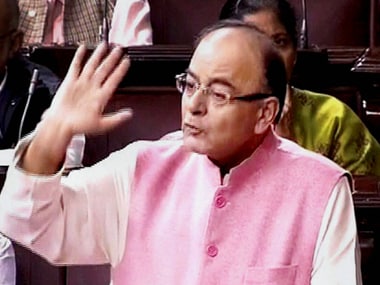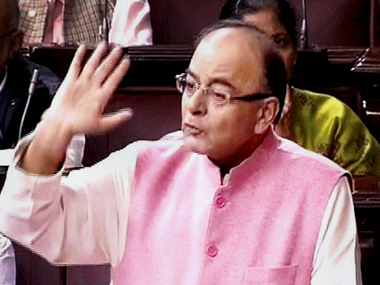There may be tougher challenges awaiting Union finance minister Arun Jaitley, with respect to the problems faced by the Indian banking sector. Being the owner of state-run banks, which constitute 70 percent of the assets in the banking industry and also over 90 percent of the bad loans on the balance sheets of Indian banks, the government will have to find ways to fund these lenders, especially in the context of the Narendra Modi government’s aversion to privatise them. [caption id=“attachment_2540642” align=“alignleft” width=“380”]  Arun Jaitley. PTI[/caption] The NDA government has said in the past that it would begin lowering stake in state run banks, but not much action has happened yet. Out of the total 27 state-run banks, government holds above 75 per cent stake in at least nine banks. Indian banks will require huge capital by 2019, at least $140 billion (about Rs 9.35 lakh crore) to meet the Basel-III requirements, global rating agency Fitch said in a note on Thursday. The government’s promised capital infusion of $11 billion (about Rs 73,000 crore) would be inadequate to meet state-run banks’ requirements, the agency said. “State-owned banks - which carry a disproportionate share of the stressed assets - have little choice but to look at strengthening balance sheets if they have to revive profitability, internal capital generation and equity valuations in any meaningful way,” the agency said. Under Basel-III, Indian banks need to have a minimum Tier-I (equity) capital adequacy ratio of 7 percent. At least 7 state-run banks currently have their Tier-I below 8 percent or in other words are close to the minimum required capital required. These lenders might need to funds urgently to be compliant with Basel norms. While Basel-III is one part of the problem, Indian banks need to have large amount of capital to provide for the bad loans. “Any sharp recovery in credit fundamentals appears unlikely with capital and asset quality-related challenges acting as impediments to growth,” said Fitch in the note. Total gross NPAs (non-performing assets) of Indian banks are currently at Rs 300,000 crore. This, coupled with the restructured loan amount, the total chunk of stressed assets will be in early double digits of the total loans given by the banking sector. For every new restructured loan or a failed loan, banks have to provide at least 15 percent of the total loan value as provisions. This works out to too large an amount to be managed by the government’s coffers. The question is who will provide the money to public sector banks, which find it difficult to raise money from markets. While the Reserve Bank of India (RBI) under Raghuam Rajan has initiated efforts to push banks for early recognition of stress in their loan portfolios to cut down future bad loans, the big question is what banks can do with the existing stock of bad assets. “New NPL (non-performing loans) growth has started to slow down across many banks, but resolution of the existing large stock will be a slow and protracted process - as structural challenges in stressed sectors still persist while corporate leverage remains high,” Fitch said. The fact is that the recovery of large corporate loans will happen only when the economic activities pick up momentum, even though banks go out to hunt down the defaulters. Also, a lot will depend upon how effectively the government manages to push key reforms across sectors to improve efficiency. Until then the ‘credit costs are likely to remain high and will continue to be an overhang on earnings growth for a longer period - unless macroeconomic recovery and speedier reforms aid faster asset resolution or banks conduct greater capital-raising to push growth, or both,” Fitch said. Unless the government moves without delay to cut stakes in the government banks and make capital available, the finance minister may find it even tougher to handle this problem in the years to come.
Unless the government moves without delay to cut stakes in the government banks and make capital available, the finance minister may find it even tougher to handle this problem in the years to come
Advertisement
End of Article


)

)
)
)
)
)
)
)
)



